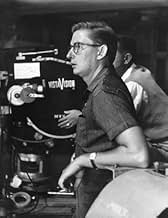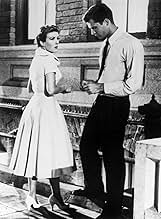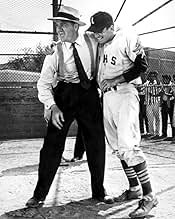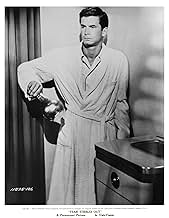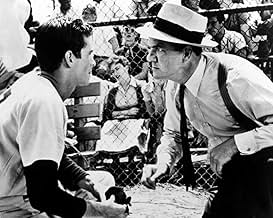CALIFICACIÓN DE IMDb
6.9/10
2.3 k
TU CALIFICACIÓN
Agrega una trama en tu idiomaTrue story of the life of Jimmy Piersall, who battled mental illness to achieve stardom in major league baseball.True story of the life of Jimmy Piersall, who battled mental illness to achieve stardom in major league baseball.True story of the life of Jimmy Piersall, who battled mental illness to achieve stardom in major league baseball.
- Dirección
- Guionistas
- Elenco
- Premios
- 1 nominación en total
John Aberle
- Ballplayer
- (sin créditos)
Eric Alden
- Policeman
- (sin créditos)
Heather Ames
- Nurse
- (sin créditos)
Sam Balter
- Broadcaster
- (voz)
- (sin créditos)
Mary Benoit
- Nurse
- (sin créditos)
John Benson
- Reporter
- (sin créditos)
Don Brodie
- Reporter Evans
- (sin créditos)
Richard Bull
- Reporter Slade
- (sin créditos)
Bart Burns
- Joe Cronin
- (sin créditos)
Edd Byrnes
- Boy in Car Assisting Jimmy Up Stairway
- (sin créditos)
Wade Cagle
- Intern
- (sin créditos)
Keith Coyne
- Baby
- (sin créditos)
Opiniones destacadas
True story of Boston Red Sox outfielder Jimmy Piersall, Anthony Perkins, struggle with mental illness by desperately wanting to please his domineering father John, Karl Malden, to be a big league baseball player. At the same time Jimmy confronted his insecurities of not having what it takes to be one. Growing up as a boy in Waterbuary Ct. Jimmy always dreamed of playing for the Red Sox not just to play professional baseball but to be able to get out of the poverty that he and his parents were stuck in all their lives.
Jimmy's father John played semi-pro ball as a young man but never had the talent to play in the big leagues and put all his effort and drive to see that Jimmy would get the chance, playing professional baseball, that he never got. Helpful at first but as John's obsession in getting Jimmy to make the grade started to take it's toll on the sensitive young man, As he finally reached his goal of making the team, fear set in on Jimmy fear that he'll fail his dad and himself. That fear lead Jimmy to have a mental breakdown during a night-game in Fenway Park after hitting an inside-the-park home run.
"Fear Strikes Out" covers Jimmy Piersall's life from a 12 year old boy in Waterbuary Ct. through his being committed into a institution for treatment of his mental illness due to the his fear that he'll never be the person that his father wanted him to be. As well as the fear that he wouldn't be able to care and provide for his parents and newlywed wife Mary, Norma Moore, and their new born daughter Eileen.
Being looked after by Dr. Brown, Adam Williams, at the institution it's painful to see Jimmy completely lose it and end up looking and acting like a person who's been lobotomized. Dr. Brown get's Jimmy to respond to his treatment by showing him the kindness and understanding that his father lacked for Jimmy during his formative years. That caused him to not just enjoy playing baseball but to become obsessed by it in wanting to fulfill the dreams that his dad had for him.
This pressure built up over the years as Jimmy worked hard to make the majors and play along the likes of baseball greats like Ted Williams Mickey Mantle and Willie Mays. There was a terrible price to all that and that price was that no matter how hard Jimmy tried he was never good enough, or as good as he could be, in the eyes of his dad John Piersall.
It turned out that it was not just Jimmy who needed mental therapy but his father as well in understanding that his son was a human being not a machine who's feeling had to be taken into account. John Piersall was relentlessly driving Jimmy to make the grade as a big league baseball player not caring, or noticing, that he was driving Jimmy straight into a nervous breakdown. Even Boston Red Sox manager Joe Cronin, Bart Burns, was more receptive to Jimmy's impending mental collapse then his father. Cronin did everything he could, through the Red Sox organization, to help Jimmy with desperately needed professional help that Jimmy's father had no idea that his son needed.
The best part of the movie "Fear Strikes Out" was when John Piersall finally understood what he did to his son Jimmy in pushing him like he did. Later at the institution John was accepted by Jimmy who for a time wanted to have nothing to do with him. For once just being his father, not a hard as nails lion trainer, the two had an friendly but emotional game of catch.
Jimmy did in the end recover form his personal demons and went on to be an All-Star outfielder for Boston Cleveland and the New York Mets, among outer teams he played for. Despite his fine record as a professional baseball player Jimmys overcoming the fear that almost destroyed him was by far Piersall's greatest achievement.
Jimmy's father John played semi-pro ball as a young man but never had the talent to play in the big leagues and put all his effort and drive to see that Jimmy would get the chance, playing professional baseball, that he never got. Helpful at first but as John's obsession in getting Jimmy to make the grade started to take it's toll on the sensitive young man, As he finally reached his goal of making the team, fear set in on Jimmy fear that he'll fail his dad and himself. That fear lead Jimmy to have a mental breakdown during a night-game in Fenway Park after hitting an inside-the-park home run.
"Fear Strikes Out" covers Jimmy Piersall's life from a 12 year old boy in Waterbuary Ct. through his being committed into a institution for treatment of his mental illness due to the his fear that he'll never be the person that his father wanted him to be. As well as the fear that he wouldn't be able to care and provide for his parents and newlywed wife Mary, Norma Moore, and their new born daughter Eileen.
Being looked after by Dr. Brown, Adam Williams, at the institution it's painful to see Jimmy completely lose it and end up looking and acting like a person who's been lobotomized. Dr. Brown get's Jimmy to respond to his treatment by showing him the kindness and understanding that his father lacked for Jimmy during his formative years. That caused him to not just enjoy playing baseball but to become obsessed by it in wanting to fulfill the dreams that his dad had for him.
This pressure built up over the years as Jimmy worked hard to make the majors and play along the likes of baseball greats like Ted Williams Mickey Mantle and Willie Mays. There was a terrible price to all that and that price was that no matter how hard Jimmy tried he was never good enough, or as good as he could be, in the eyes of his dad John Piersall.
It turned out that it was not just Jimmy who needed mental therapy but his father as well in understanding that his son was a human being not a machine who's feeling had to be taken into account. John Piersall was relentlessly driving Jimmy to make the grade as a big league baseball player not caring, or noticing, that he was driving Jimmy straight into a nervous breakdown. Even Boston Red Sox manager Joe Cronin, Bart Burns, was more receptive to Jimmy's impending mental collapse then his father. Cronin did everything he could, through the Red Sox organization, to help Jimmy with desperately needed professional help that Jimmy's father had no idea that his son needed.
The best part of the movie "Fear Strikes Out" was when John Piersall finally understood what he did to his son Jimmy in pushing him like he did. Later at the institution John was accepted by Jimmy who for a time wanted to have nothing to do with him. For once just being his father, not a hard as nails lion trainer, the two had an friendly but emotional game of catch.
Jimmy did in the end recover form his personal demons and went on to be an All-Star outfielder for Boston Cleveland and the New York Mets, among outer teams he played for. Despite his fine record as a professional baseball player Jimmys overcoming the fear that almost destroyed him was by far Piersall's greatest achievement.
I still remember seeing this as a Little League-age kid in the theater as our family was vacationing in Florida.
When I saw it again, some 40 years later, parts of the film were still very familiar, a testimony to how powerful some of these scenes were. I never forgot them.
This was a based-on-a-true-life account of major league baseball player Jimmy Piersall, a very talented player who suffered a nervous breakdown. The enormous pressure to succeed that was driven into him by his never-satisfied father was pictured as the cause which made him snap.
Anthony Perkins, who plays Piersall, and Karl Madlen, who portrays his dad, are both excellent, riveting characters. Some say this was Malden's best performance ever. Perkins was no slouch, either. This is the classic sports story of an overzealous parent living his or her dreams through their child.
The baseball segment of this film ended about halfway through. From that point, after Perkins breaks down at the park, climbing the backstop fence in a horrifying scene, the film actually gets even more interesting with everyone in the film contributing although the cast, after Perkins and Malden, is a pretty much an unknown-name one.
The only unrealistic part of the film, typical of sports films until the 1980s, was seeing an actor play a ballplayer when he "throws like a girl," as the old expression went. The younger actor playing Piersall as a kid was no better than Perkins in this regard. Neither had a clue how to a throw a ball. It looks corny nowadays.
Oh, well. That wasn't the focus of the story, anyway. As powerful as this film was, it apparently didn't have much of an effect as pushy parents in sports still exist and probably always will, taking the fun out of sports for a number of kids.
It's still a memorable film and worth your time today, especially if you have never seen it.
When I saw it again, some 40 years later, parts of the film were still very familiar, a testimony to how powerful some of these scenes were. I never forgot them.
This was a based-on-a-true-life account of major league baseball player Jimmy Piersall, a very talented player who suffered a nervous breakdown. The enormous pressure to succeed that was driven into him by his never-satisfied father was pictured as the cause which made him snap.
Anthony Perkins, who plays Piersall, and Karl Madlen, who portrays his dad, are both excellent, riveting characters. Some say this was Malden's best performance ever. Perkins was no slouch, either. This is the classic sports story of an overzealous parent living his or her dreams through their child.
The baseball segment of this film ended about halfway through. From that point, after Perkins breaks down at the park, climbing the backstop fence in a horrifying scene, the film actually gets even more interesting with everyone in the film contributing although the cast, after Perkins and Malden, is a pretty much an unknown-name one.
The only unrealistic part of the film, typical of sports films until the 1980s, was seeing an actor play a ballplayer when he "throws like a girl," as the old expression went. The younger actor playing Piersall as a kid was no better than Perkins in this regard. Neither had a clue how to a throw a ball. It looks corny nowadays.
Oh, well. That wasn't the focus of the story, anyway. As powerful as this film was, it apparently didn't have much of an effect as pushy parents in sports still exist and probably always will, taking the fun out of sports for a number of kids.
It's still a memorable film and worth your time today, especially if you have never seen it.
This is not what one would call a pleasant film to watch particularly about Baseball. It tells the true story of former major league ball player Jim Piersall of the Boston Red Sox and his eventual mental breakdown. While certain events are not exactly the way they took place the story nonetheless sticks pretty much to fact. Anthony Perkins puts in a dynamic performance as Piersall. A kid who likes baseball but is driven to madness by his domineering perfection minded father played by Karl Malden. Also included in the cast is Norma Moore as Jims devoted wife Mary and Adam Williams as the psychiatrist Doctor Brown.
The first half of the picture deals with Piersall growing up practicing and playing baseball always under the scrutiny of his father. Whatever Jim did on the playing field it could always have been done better according to his Dad. The second half of the film deals with Piersalls mental breakdown and subsequent treatment and recovery. While watching a ball game on TV he makes remarks that his doctor picks up on and uses to unlock the reason why he cracked up. These same circumstances are no doubt still occurring today as many parents push their children relentlessly in everything from sports to academics to beauty pageants. Jim Piersalls story fortunately became a book and later this fine film that perhaps has and will continue to serve as a message to those who watch it. Whether you're a baseball fan or not this is a movie to be seen.
The first half of the picture deals with Piersall growing up practicing and playing baseball always under the scrutiny of his father. Whatever Jim did on the playing field it could always have been done better according to his Dad. The second half of the film deals with Piersalls mental breakdown and subsequent treatment and recovery. While watching a ball game on TV he makes remarks that his doctor picks up on and uses to unlock the reason why he cracked up. These same circumstances are no doubt still occurring today as many parents push their children relentlessly in everything from sports to academics to beauty pageants. Jim Piersalls story fortunately became a book and later this fine film that perhaps has and will continue to serve as a message to those who watch it. Whether you're a baseball fan or not this is a movie to be seen.
This a very interesting, but not totally factual, account of the life of Jimmy Piersall. Piersall was a popular player with the Boston Red Sox. His antics on and off the field are now legendary. Piersall fell in love with baseball at a young age, but his domineering father forced Jimmy to not only achieve, but to play to perfection. Mr. Piersall's constant manipulating can be traced to his son's mental breakdown.
Anthony Perkins puts in a dedicated performance as Jimmy Piersall. Karl Malden excelled as the relentless Mr. Piersall. Also in the cast are Bart Burns, Norma Moore and Adam Williams.
This is a very stark and interesting movie, just don't take all the content as gospel. A baseball fan's delight.
Anthony Perkins puts in a dedicated performance as Jimmy Piersall. Karl Malden excelled as the relentless Mr. Piersall. Also in the cast are Bart Burns, Norma Moore and Adam Williams.
This is a very stark and interesting movie, just don't take all the content as gospel. A baseball fan's delight.
FEAR STRIKES OUT dealt with a theme not often portrayed in films of the '50s--mental illness--and is a shattering example of how a father's insistence on perfection can have a significant effect on the well being of a sensitive individual unable to meet his father"s expectations. Marketed at time of release as a baseball movie, it's really a relationship movie about a father and son--that is the real heart and soul of the story.
Based on the real life story of Jim Piersall, a well known American sports figure for the Boston Red Sox, as taken from his own account of his life. Slowly the picture emerges of the kind of stress he was under to achieve his goal of playing in the majors, the kind of guilt he felt whenever he did something that aggravated his father--as in simple disobedience when he didn't come straight home after work and then broke his ankle at an ice skating rink.
Even in the midst of achievements, his father finds flaws to criticize. "Wish me luck," he pleads with his father when the Red Sox signs him. "No, luck won't do it. You've got to be thinking and planning all the time."
And later on in the film, after his breakdown and he lands in a mental asylum, he defends his father to his psychiatrist with, "If it hadn't been for him pushing me and driving me, I wouldn't be where I am today!" Chilling words and the scene is the turning point in Piersall's progress toward recovery and the root cause of his problems.
It's the sort of film everyone can relate to, sports minded or not, because it does reveal the danger of parents who expect too much from their children, with tragic results. The scene where Malden tries to take him from the hospital before he's ready to go, is a chiller.
Both ANTHONY PERKINS and KARL MALDEN give the kind of performances that merited at least Oscar nominations--solid and superb.
Summing up: A satisfying, mature drama that takes a penetrating look at the danger of pressure-driven father/son relationships in the sports world where winning is the only thing that counts.
Based on the real life story of Jim Piersall, a well known American sports figure for the Boston Red Sox, as taken from his own account of his life. Slowly the picture emerges of the kind of stress he was under to achieve his goal of playing in the majors, the kind of guilt he felt whenever he did something that aggravated his father--as in simple disobedience when he didn't come straight home after work and then broke his ankle at an ice skating rink.
Even in the midst of achievements, his father finds flaws to criticize. "Wish me luck," he pleads with his father when the Red Sox signs him. "No, luck won't do it. You've got to be thinking and planning all the time."
And later on in the film, after his breakdown and he lands in a mental asylum, he defends his father to his psychiatrist with, "If it hadn't been for him pushing me and driving me, I wouldn't be where I am today!" Chilling words and the scene is the turning point in Piersall's progress toward recovery and the root cause of his problems.
It's the sort of film everyone can relate to, sports minded or not, because it does reveal the danger of parents who expect too much from their children, with tragic results. The scene where Malden tries to take him from the hospital before he's ready to go, is a chiller.
Both ANTHONY PERKINS and KARL MALDEN give the kind of performances that merited at least Oscar nominations--solid and superb.
Summing up: A satisfying, mature drama that takes a penetrating look at the danger of pressure-driven father/son relationships in the sports world where winning is the only thing that counts.
¿Sabías que…?
- TriviaThe real Jimmy Piersall disowned the movie due to its distortion of the facts. Based on the success of his autobiography and the movie, Piersall penned a second book in 1985 called The Truth Hurts, which detailed his ousting from the White Sox organization.
- ErroresClose-up shots of Jimmy Piersall playing shortstop and right field reveal a low outfield wall backed by trees in the background. These games were supposed to be in Fenway Park, which would have a high left field wall and bleachers in right field.
- Citas
Jim Piersall: I don't care what happens. I love you Mary!
- ConexionesFeatured in Diamonds on the Silver Screen (1992)
Selecciones populares
Inicia sesión para calificar y agrega a la lista de videos para obtener recomendaciones personalizadas
- How long is Fear Strikes Out?Con tecnología de Alexa
Detalles
- Fecha de lanzamiento
- País de origen
- Idioma
- También se conoce como
- Fear Strikes Out
- Locaciones de filmación
- Productora
- Ver más créditos de la compañía en IMDbPro
- Tiempo de ejecución1 hora 40 minutos
- Color
- Relación de aspecto
- 1.85 : 1
Contribuir a esta página
Sugiere una edición o agrega el contenido que falta


